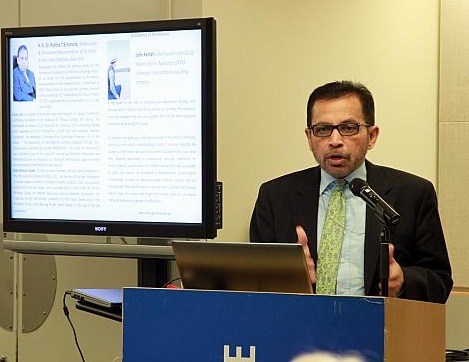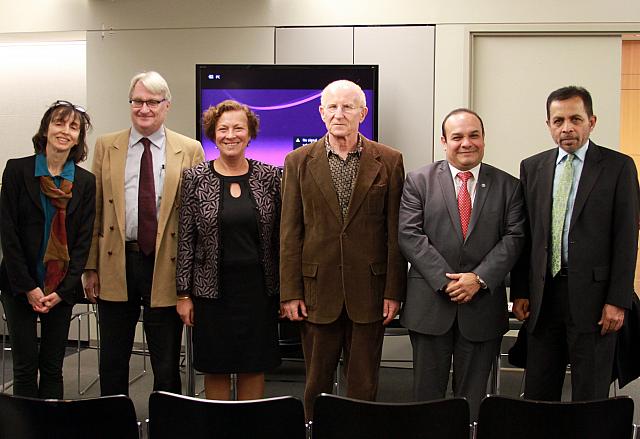“Freedom of Information in the Genetically Modified Age:
Water, Food, Health and Environment”

Statement by H. E. Dr. Palitha KOHONA
Ambassador and Permanent Representative of Sri Lanka to the United Nations
CUNY Graduate Center, NYC - 20th October, 2014
I take this opportunity to thank the Light Millennium for organizing this timely event and inviting me to participate in the panel discussion.
The use of biotechnology in food production has become one of the most controversial issues in modern agriculture due to substantially different perceptions of the associated risks and benefits. Even though genetically modified crop varieties provide farmers with enhanced economic benefits, serious concerns are being raised about the longer-term environmental and health impacts of GM crops and the safety of foods containing genetically modified organisms. Many countries require at least detailed labeling of products that contain GMOs to ensure consumer awareness. Some countries exclude GM products entirely.
Millions of farmers around the world have adopted biotech crops in the belief that biotech crops provide sustainable socio-economic advantages. Biotech crops are likely to make a significant contribution to food security, poverty eradication and hunger alleviation. They may also assist in mitigating climate change and reducing greenhouse gases and the efficient use of water. GM crops could be a valuable aid to feed the growing human population.
Since 1996, the total area of land dedicated GM crops has rapidly increased from 1.7 million hectares to over 175 million hectares in 2013. GM crops have been adopted by both developed and developing countries. They are widespread in the American region. The USA accounts for 70 million hectares of the world’s GM crops. Other main growers of GM crops include Brazil, Argentina, India, Canada and China. Soybean, cotton, maize and canola are the dominant biotech crops in both developed and developing countries. Latin American, Asian and African farmers collectively grew 94 million hectares compared with 81 million hectares in industrialised countries. During the period 1996-2012 cumulative economic benefits of GM crops in industrialised countries stood at US$ 59 billion compared with US$ 57.9 billion generated by developing countries.
The opposition to GM crops has been growing worldwide as agronomical failures as well as health and environmental consequences are being identified. Recently a $ 1 Billion lawsuit was filed against Syngenta by U.S. farmers over China’s rejection of GM corn. The farmers alleged that the export of US corn to China was curtailed and domestic corn prices depressed due to China’s rejection of all shipments containing traces of Syngenta’s MIR162. Skepticism over GM crops may have played a key role in a recent decision by China to move away from GM production. In August, the Ministry of Agriculture of China announced that it would not continue with its GM rice and corn programme.
Agriculture plays a central role in the Sri Lankan economy providing employment to 29.7% of the labor force and generating 10.8% of the GDP in 2013. Food and nutrition security is considered a national priority for the Government. The Mahinda Chintana, Vision for the Future, clearly highlights the National Agriculture Policy, National Livestock Development Policy, National Fisheries and Aquatic Resources Development Policy and the Food and Nutrition Policy of Sri Lanka. The national food security programmes are aimed at improving agricultural productivity contributing to food and nutrition security.
Agriculture development in Sri Lanka is confronted with the challenges of increasing scarcity of land and water and extreme weather conditions, including irregular rain patterns and persistent droughts. Accordingly, advanced new technologies need to be introduced to ensure food security and sustainable agricultural development. Genetically modified crops can be adopted in Sri Lanka as a potential option in agro-economic development. At present, genetically modified organisms are not produced in Sri Lanka. The importation of genetically modified food items is not prohibited. The Government of Sri Lanka adopted a regulation to the Food Act, allowing genetically modified food imports. A National Policy on Biosafety was also adopted in 2011. It covers the importation of Genetically Modified Organisms, i.e., GM food or crops into Sri Lanka.
All importers are required to make a declaration stating whether their consignments contain any GMOs. It is mandatory to label the content of all GM foods, providing freedom of choice to the consumer. It is also mandatory to carry out, thorough research, to establish that a product is fit for human consumption before it is labeled as a GM food. An application must be submitted to the relevant authority by an importer who wishes to import a product which might contain GMOs. Once the Biosafety Expert Consultation Committee approves the risk assessment report, an importer may import the product with appropriate labeling.
Being a developing country Sri Lanka does not have the relevant technology to produce GM crops. Most Sri Lankan consumers are not fully aware of the complexities of GM food, and there is a perception that GM food could be risky to human health. Environmentalists warn against the use of GM technology on crops since there has not been evidential proof to show that genetically modified organisms are not harmful to humans.
Considering both the negative and positive impacts of this revolutionary technology in agriculture, governments need to strengthen the legal and institutional framework before embracing the new technology. There is also a need to improve public awareness. Advanced laboratory facilities are essential to further develop agricultural biotechnology. One of the main constraints to the widespread adoption of this new technology is the lack of relevant science-based and cost/time-effective regulatory systems and facilities.
PROGRAM with the Bios of the Speakers
CUNY Graduate Center, Oct. 20, 2014
Photo Album

Speakers and co-organizers of the event from left to right:
Julie Mardin, Dr. Michael Hansen, Bircan Unver,
Prof. Abdullah Tansel, Amb. Carlos Garcia, Amb. Palitha Kohona

